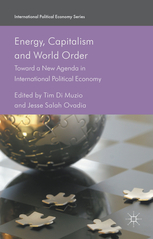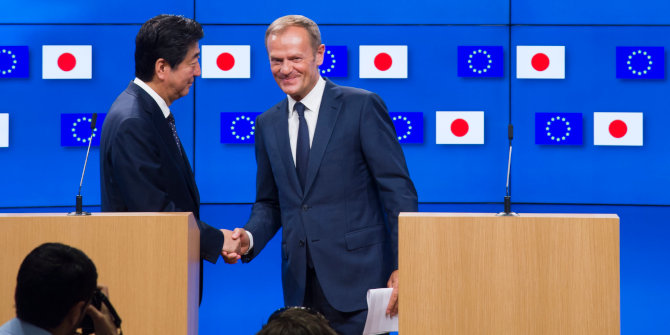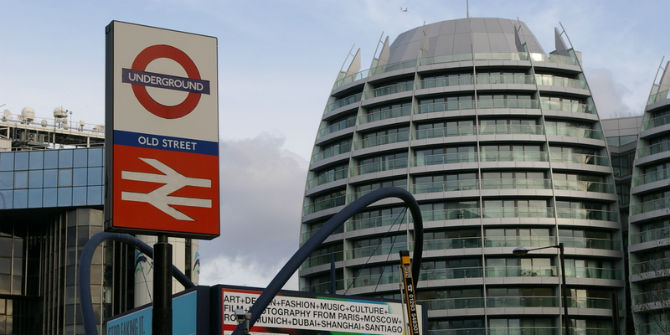In this new collection, editors Tim Di Muzio and Jesse Salah Ovadia bring together contributors to examine the relationship between energy, capitalism and the world order in light of pressing and emergent issues such as fracking, biofuels and climate change. While more attention on the diverse challenges faced by different political economies would have been welcome, the collection presents lucid analyses and grounded case studies that will be of use to scholars, students and policymakers, finds Donn David P. Ramos.
Energy, Capitalism and World Order: Toward a New Agenda in International Political Economy. Tim Di Muzio and Jesse Salah Ovadia (eds). Palgrave Macmillan. 2016.
 Increased global concern about the use of finite natural resources as well as the predominance of climate change discourse have brought about changes in how stakeholder energy is viewed today. With contributors coming from diverse fields, the collection Energy, Capitalism and World Order: Toward a New Agenda in International Political Economy presents a combination of perspectives to reveal how International Political Economy (IPE) ‘has largely neglected to provide any deep theorisation and historically situated analysis of the relationship between energy, capitalism and the remaking of the world order’ (1).
Increased global concern about the use of finite natural resources as well as the predominance of climate change discourse have brought about changes in how stakeholder energy is viewed today. With contributors coming from diverse fields, the collection Energy, Capitalism and World Order: Toward a New Agenda in International Political Economy presents a combination of perspectives to reveal how International Political Economy (IPE) ‘has largely neglected to provide any deep theorisation and historically situated analysis of the relationship between energy, capitalism and the remaking of the world order’ (1).
With this as a backdrop, editors Tim Di Muzio and Jesse Salah Ovadia highlight the interconnected themes of this account: (1) Energy, Capitalism, and International Theory, dealing with the theorisation of the international context, utilising energy and capitalism as interconnected analysis; (2) Energy, Capitalism and the (Re)making of World Order, which explores energy, capitalism and their relationship to the making and remaking of the world order; and (3) Energy, Capitalism and the 21st Century, which deals with critical moments in twenty-first-century capitalism, including issues like biofuel, tar sands and hydraulic fracturing revolutions.
In the first chapter, ‘IPE and the Unfashionable Problematic of Capital and Energy’, Di Muzio revisits the conceptualisation of capital and capitalism from various theoretical standpoints in order to contextualise the energy issue. He explains that ‘IPE has generally been blind to the importance of energy for explaining uneven patterns of historical development and likely future trajectory of the global political economy’ (29). He then develops a critique of this relative lack of theorisation of energy in political economy literature as it is conceptualised now. The reader may initially agree with the contention and acknowledge the need for a deeper exploration of the issues at hand; however, what was expected is further articulation of how current IPE theories can be modified then applied, as well as to what extent newer theories can be formulated, to explain the intermingling of energy and political economy.
 Image Credit: (Jenny Downing CC BY 2.0)
Image Credit: (Jenny Downing CC BY 2.0)
Following the diverse conceptual and theoretical accounts in Part One, specific cases are presented in Part Two to emphasise how IPE can delve into ‘the importance of energy in its analysis and accounts of world order making and everyday life’ (23-24). These chapters highlight different dimensions like oil and capitalist development (one in the general context of the Global South, with another focusing on the Venezuelan experience), the exiting North American Energy Bloc as well as the issue of low-carbon transition in the context of the political economy of climate change.
Regarding the latter topic, in ‘The Political Economy of (Climate) Change: Low-Carbon Energy Transitions’, with climate change as a global environmental issue of the current world order, the interconnection between capitalism and the transition to low-carbon energy is ably examined. In analysing these conditions, Peter Newell stresses the ‘many political economies of climate change’ (130), and the importance of incorporating ‘shifts in power relations and geo-politics produced by globalisation and what these mean for collective efforts to tackle climate change’ (133-34). Yet, the corresponding risks with the effects of climate change – even with the introduction of low-carbon energy transitions – were not fully explored, and may leave the reader craving more. Moreover, what was glossed over are the current and future challenges faced by developing countries that are still trying to achieve industrialisation despite the trend towards low-carbon energy transition. In spite of these limitations, the chapter – in theory and in practice – could stand alone as a book in itself, especially with its corresponding recommendations in addressing the climate change juggernaut, like introducing change in the energy order and being catalysts in shaping a world founded on social justice and environmental stewardship for future generations.
Accordingly, the last chapter, ‘Critical IPE, the Open Range and the Illusion of the Epoch’, presents the most appropriate conclusion for the collection. Di Muzio explains that:
energy problems – whether they are theorised by the mainstream perspective as potential wars or conflicts or in terms of opportunities for greater cooperation – are not going away anytime soon, nor is the geological fact that fossil fuels are ultimately non-renewable on a human time scale (202).
The different accounts and arguments that Energy, Capitalism and the World Order provides are a demonstration of the editors’ and contributors’ shared capacity to grapple with the dynamic interplay of energy and the future of the world order in the context of global capitalism. What seems lacking is that, among the three thematic areas of the collection, the political economy of energy structures and a more grounded and newer theorisation of this vis-à-vis their relationship with the future of a capitalist world order are not fully explored: it would have been clearer if the book showed how the multiple political economies of developed and developing countries respond to their specific contexts in order to address their divergent energy conditions and resource requirements.
This notwithstanding, Energy, Capitalism and World Order presents lucid analyses, grounded cases and pinpointed interpretations that deal with IPE’s limited scholarship on energy and social transformation. As the editors convey in the introduction: ‘while advanced capitalist countries focus attention on the global political economy of energy in order to begin to address the contradictions of democracy and carbon capitalism, foregrounding energy in the political-economic analysis of development and underdevelopment in the global south produces very different but no less important questions for understanding energy, capitalism and world order’ (11). The book will be helpful for readers in academic fields like development studies, history, geography, international relations, political science, public administration and even sociology. It may also be of interest to practitioners in the energy sector, policy experts, government and the public sector, as well as other experts who want to examine energy and its relationship with capitalism and the future world order through the prism of international political economy.
Please read our comments policy before commenting.
Note: This article gives the views of the author, and not the position of EUROPP – European Politics and Policy, nor of the London School of Economics.
Shortened URL for this post: http://bit.ly/2gaIPfa
_________________________________
Donn David P. Ramos is currently a PhD in Sociology candidate at the Ateneo de Manila University, Philippines. His dissertation is on Green Building Systems and Standards. He is interested in social development, green building practices, energy consumption and sustainability.




